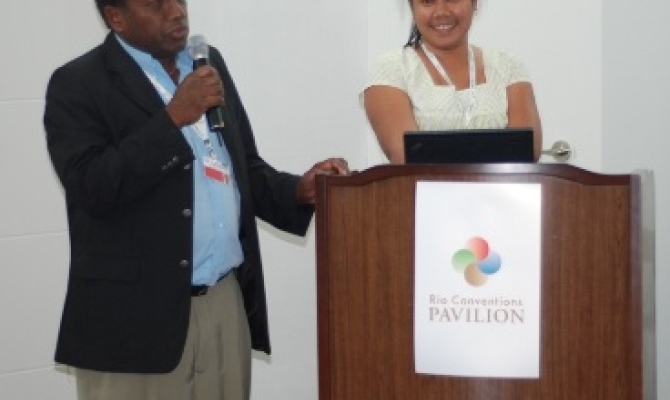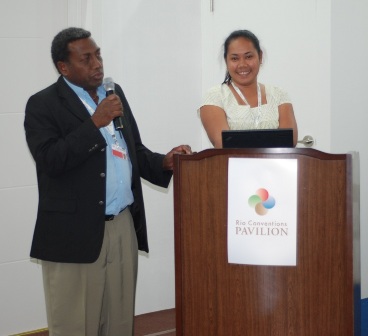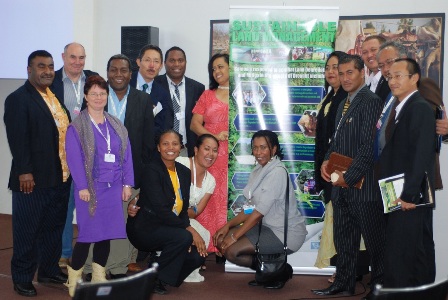
20 October 2011, Changwon Korea - Pacific experiences and lessons from a global project on Sustainable Land Management were shared with a wide group of participants at a side event at the 10th Conference of the Parties to the United Nations Convention to Combat Desertification.
In all there are 46 least developed countries and small island developing states have participated in this project which aims bring about effective land management through building capacity and mainstreaming.
The "Sustainable Land management: Impacts and Lessons from a Programmatic Approach to Building Capacities for Sustainable Land Management in Least Developed Countries – Small Islands Developing States" event was held at the Rio Ecosystem Pavilion.
Land degradation is widely recognized as a fundamental ecological problem that affects the economic and social wellbeing of people at national and local levels and undermines the functions and services of ecosystems at a global level. Least developed countries and Small Island Developing (SID) states are particularly vulnerable.
Lessons were shared from the Africa, Asia, Caribbean and Pacific regions and these highlighted experiences in developing national and local human capacity to address Sustainable Land Management issues at a national level.
 L-R William Ganileo (Vanuatu), Annie Mauga (Samoa)
L-R William Ganileo (Vanuatu), Annie Mauga (Samoa)
Samoa and Vanuatu made a joint presentation on Pacific regional lessons.
Achievements made in the region under this project include; seawalls to control coastal erosion; studies to minimise slopes erosion; coastal planting; nurseries to rehabilitate degraded areas; resource and training centres; skills transfer in nursery establishment, and grafting; agro-forestry; on-site demonstration training; and awareness at local, community and national levels.
The Pacific also experienced a number of challenges during the implementation of the project. These ranged from the acceptance of new hybrids versus local root crops, policy changes so as to address desertification, land degradation and drought as well as the introduction of new practices, to name only a few.
"One of the challenges we faced in the Pacific was changing the traditional systems of agriculture for communities and promoting new ways which will prevent degradation," said Annie Mauga, the assistant coordinator of the Samoa Sustainable Land Management Project.
"Land ownership where the majority of Pacific land is traditionally owned can become a big challenge for us in the region," added William Ganileo, the Sustainable Land Management Coordinator of Vanuatu.
Bruce Jefferies, SPREP Terrestrial  Ecosystems Management Officer, who attended the presentations, commented after the side event that both staff members had made particularly useful contributions as they had focused their presentation material on "real world" examples.
Ecosystems Management Officer, who attended the presentations, commented after the side event that both staff members had made particularly useful contributions as they had focused their presentation material on "real world" examples.
"During international forums, such as the UNCCD COP10, presentations tended to dwell on theoretical ideas and concepts, it was important to share experiences from people that were actually working at an operational level."
"This was an excellent side event! We'd like to hear more planning experiences from actions that people are doing on the ground and what are the strategies to expand and consolidate those successes and lessons learnt," said Tepa Suaesi, SPREP's Environmental Planning Officer.
"It would be really interesting to know more about the numbers of people involved with these worldwide projects, how many are facilitating SLM initiatives and the level of participation."
To access the pdf versions of the Pacific power point presented please click here.
More news and images from the UNCCD COP10 in Korea available on the Bionesian blog.